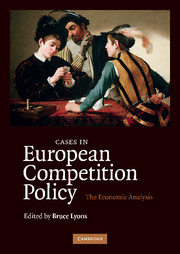Book contents
- Frontmatter
- Contents
- Contents by potentially anticompetitive business practices
- Contents by markets
- List of figures
- List of tables
- List of contributors
- Preface
- Introduction: the transformation of competition policy in Europe
- A Anticompetitive behaviour by firms with market power
- B Agreements between firms
- Introduction
- B.1 Cartels
- 5 The graphite electrodes cartel: fines which deter?
- 6 Assessment of damages in the district heating pipe cartel
- B.2 Other horizontal agreements
- B.3 Vertical agreements
- C Mergers
- Bibliography
- Index
5 - The graphite electrodes cartel: fines which deter?
Published online by Cambridge University Press: 05 June 2012
- Frontmatter
- Contents
- Contents by potentially anticompetitive business practices
- Contents by markets
- List of figures
- List of tables
- List of contributors
- Preface
- Introduction: the transformation of competition policy in Europe
- A Anticompetitive behaviour by firms with market power
- B Agreements between firms
- Introduction
- B.1 Cartels
- 5 The graphite electrodes cartel: fines which deter?
- 6 Assessment of damages in the district heating pipe cartel
- B.2 Other horizontal agreements
- B.3 Vertical agreements
- C Mergers
- Bibliography
- Index
Summary
Introduction
Agreements between undertakings aimed at fixing prices, limiting output or sharing markets without any expectation of offsetting benefits to consumers are prohibited under Article 81 of the EC Treaty. Cartels are obviously included in this. A violation of this prohibition can for each violator attract a fine up to 10 per cent of its worldwide turnover. This fine will in the first instance be levied by the Directorate General for Competition following their investigation and is formally an administrative rather than a criminal fine. Their decision can be appealed to the Court of First Instance (CFI) and subsequently to the European Court of Justice (ECJ). In order to overcome the information problems in detecting and prosecuting cartel agreements, the EU has introduced a leniency programme which rewards cooperation by cartel members through a reduction in the fine.
The law on cartels, like other areas of competition policy, is founded on principles of economics, but economists are rarely involved in its application against explicit hard-core collusive agreements. In part, this is due to the absence of evidentiary problems – direct evidence may be found from a whistleblower or in dawn raids (e.g. e-mails) – and thanks to leniency programmes, cartel members may either reveal details of their infringement in return for immunity from fines or start cooperating and providing evidence in return for a leniency discount once an investigation into their industry has been opened.
- Type
- Chapter
- Information
- Cases in European Competition PolicyThe Economic Analysis, pp. 137 - 158Publisher: Cambridge University PressPrint publication year: 2009
- 1
- Cited by



